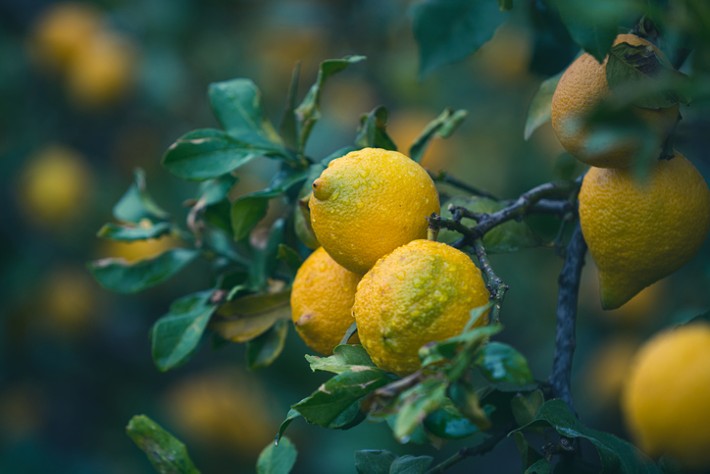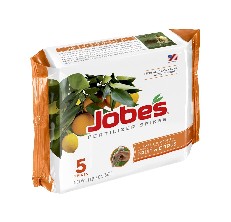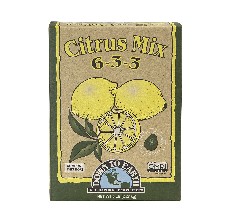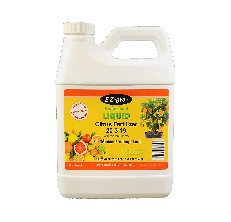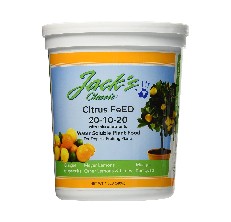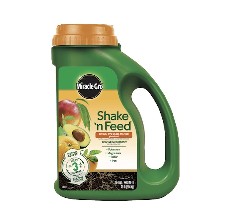- Flowers & PlantsVegetablesOur content is meticulously curated through independent research, testing, reviews, and AI-driven recommendations, all designed to present you with the finest product choices. When you make a purchase through our links, it could result in us earning a commission.
The Best Citrus Tree Fertilizers of 2024
Last updated: Apr 12, 2024
If there’s one thing we know for sure, it’s that you can never go wrong with a citrus plant, especially if you love fruits of all kinds. Citrus fruits make it possible to grow mandarins, lemons, grapefruits, and oranges, all of which serve as a natural source of vitamin C. Citrus fruits are also perfect for people who would prefer to rely on healthy alternatives to junk food when they experience sweet or sour cravings. To give your citrus tree the best chance at growing and prospering, check out our list of citrus tree fertilizers! Our favorite is Jobe’s 01002 Citrus Tree Fertilizer.
Our Top Picks For Citrus Tree Fertilizers
- Best Overall: Jobe’s 01002 Citrus Tree Fertilizer Shop Now ➔
- Most Eco-Friendly: Down to Earth Organic Citrus Tree Fertilizer Shop Now ➔
- Most Efficient: Ez-Gro Citrus Tree Fertilizer Shop Now ➔
- Affordable Pick: J R Peters Inc Citrus Tree Fertilizer Shop Now ➔
- Also Consider: Miracle-Gro Citrus Tree Fertilizer Shop Now ➔
View all ContentsThe Best Citrus Tree Fertilizers
Best Overall
If your plant needs a boost of energy, you need to buy spikes instead of normal fertilizers. These spikes by Jobe’s come premeasured and offer a timed-release formula for more efficacy. They nourish citrus plants at their roots without creating a mess, and the best part about them is their accessibility and ease of use.
Easy to insert in the ground, the optimal time to use this is in late fall and early spring as citrus plants need the most nutrients for growth during these seasons. The best thing about this fertilizer is that it doesn’t have any chemical smell.
Pros
- Offer slow-release nutrients for growth
- Offers a continuous supply of nutrients
- Mess-free application
Cons
- The spikes are prone to breakage
Most Eco-Friendly
Boasting an impressive lineup, Down to Earth offers a range of sulfate, kelp meal, basalt, zinc sulfate, fishbone meal, and greensand among others. This fertilizer will make your citrus plants perk up, and the best part about this five-pound bag is that it incorporates the 6-3-3 NPK formula to give you the best yield.
Delivering the proper ratio of potassium, nitrogen, and phosphorus levels to promote bountiful fruit, you’ll achieve lush new growth and abundant green foliage in no time!
The best thing about this fertilizer? It’s packed in a 100% recyclable and unbleached paperboard to minimize the impact on the environment.
Pros
- Contains primary and secondary nutrients
- Accommodates trees, vines, and ornamentals
Cons
- Can cause fungus
Most Efficient
Whether it’s orange, mango, avocado or lime this fertilizer is the perfect way to achieve a green thumb! Coming to you with a free measuring cup that makes it easy to mix and use, this concentrated liquid fertilizer supplies high-grade and pure nutrients directly to the roots. To dilute this mixture, simply calculate the appropriate water-fertilizer ratio for your unique size of the pot.
Applying this fertilizer is also a breeze. You just need to mix the solution with water before you apply it to the soil. Its 20-3-19 NPK formula also delivers the ideal ratio of nitrogen, phosphate, and potassium to citrus trees.
Pros
- Ideal for both large and dwarf varieties
- Suitable for both outdoor and indoor plants
- Infused with micronutrients for quicker growth
Cons
- A bit overpriced than other choices
Affordable Pick
This fertilizer is designed to offer the optimum amount of nutrients that citrus plants need for growth. The powerful main ingredients of the fertilizer are enhanced even more with the additional micronutrients. In turn, the micronutrients assist by way of producing more fruit, vibrant green leaves, and stronger branches.
Its advanced formulation uses only the best quality nutrients. Allowing the plants to absorb them through the leaves and the roots, it comes in granular form and works best with water. It releases the nutrients slowly to give you the best results.
Pros
- Triggers new growth
- Ideal for tropical plants
- Has a water-resistant label
Cons
- Might come in hard as a rock
Also Consider
If you are looking for an apply-and-move-on kind of fertilizing solution for your citrus plant, then this one is a match made in heaven for you. It is loaded with powerful ingredients such as iron, sulfur, magnesium, and potassium to help deal with common nutrient deficiencies that citrus trees suffer from.
Since it contains essential nutrients, you can use it on citrus, mango, and avocado trees. You won’t have to spend your money frequently since this fertilizer can last up to three months. This citrus tree fertilizer is nutrients packed and cost-efficient, making it the best choice for those on a budget.
Pros
- Perfect for new and existing trees
- Increases water absorption
- Doesn’t burn citrus plants
Cons
- Might kill some plants
Buyer’s Guide: Citrus Tree Fertilizer
Everyone wants to get the best food for their trees while making sure that the chosen fertilizer is reasonably priced, easy to use, manageable, and compatible with all plants. To help you find the top citrus tree fertilizer, we’ve curated this detailed buying guide.
Features to Consider
When shopping for fertilizers for your citrus trees, you need to consider some agricultural and economic factors before you make your final purchase. Here’s what you need to keep in mind when you go shopping for your next citrus tree fertilizer.
NPK
NPK is the ratio of nitrogen, phosphorus, and potassium. Plants need these three ingredients to stay healthy and grow strong, and each nutrient plays its own role.
Price
The price of fertilizers is not quite diverse. The typical price range falls between $10 and $40. While the value packs can cost around $50 USD or more, they tend to be of better quality as you get more supply that will last longer.
Pack volume
Investing in a plant and its growth can be expensive. To lower the expense and make it budget-friendly, look for multiple packs of fertilizers or buy a value deal. You can subscribe to a weekly, monthly, or yearly box of citrus fertilizers to save additional money.
Type of fertilizer
You will find fertilizers in many forms, including liquid fertilizers, spikes, manure, and powdered fertilizers. It all comes down to what your plant needs the most and which formulation will suit it the best.
Efficacy
Try to look for organic fertilizers since they are the most effective and offer good results. Chemical fertilizers can protect citrus from sunlight, pollution, and pests.
To achieve optimal results, buy a fertilizer that is organic and formulated exclusively for your citrus plant.
How to Fertilize Citrus Trees
Follow these steps to produce big blooms and larger fruit yields:
Step one
Buy an organic or natural fertilizer instead of a synthetic fertilizer to prevent burning your citrus tree.
Step two
Measure the amount of citrus tree fertilizer you need according to your citrus tree’s age and size.
Step three
Apply the organic fertilizer evenly to the plant. Keep the applicator one foot away from the tree’s trunk and end the application when you reach the drip line. To finish, dig small holes with a rake to spread the fertilizer.
Step four
Layer some compost and water it thoroughly.
The Benefits of Using Citrus Trees Fertilizers
Here are some compelling reasons to start your plants on a fertilizer:
- Fertilizers are easy to apply, transport, and store.
- Fertilizers have a quick plan of action that delivers an instant effect on plants.
- You can find a specific fertilizer supplement if your citrus tree is lacking in certain nutrients and not others.
People Also Asked
How frequently should I fertilize my citrus plants?
Generally speaking, you should aim to fertilize your citrus tree thrice every year to obtain a decent yield. Start in February, give the next feed in May, and end the cycle in August. The best time to feed a citrus plant fertilizer is during its active growth period.
Which natural fertilizers can I use for my citrus trees?
Natural fertilizers, also known as organic fertilizers, are directly derived from natural sources like plants and animals. Some of the best natural fertilizers contain bone meal, compost, or manure.
Is it a good idea to use coffee grounds as fertilizer for lemon?
Yes, it is! Coffee grounds are one of the best foods for citrus trees because coffee grounds contain NKP and release it gradually. To apply, just be sure to bury the coffee grounds a few inches under the dirt to avoid attracting pesky critters like possums, raccoons, and other scavenging animals.
Can I use Epsom salt on citrus trees?
Magnesium sulfate, commonly known as Epsom salt, is one of the richest sources of sulfur and organic magnesium. If you want to use it on citrus, proceed with half of the recommended water-salt ratio and build from there.
Article Contributors
Read More About Garden Gate Review Team HereThe Garden Gate Review Team is a group of writers, editors, and gardeners, dedicated towards writing trustworthy product reviews that'll help you choose the best products for a beautiful garden and backyard.
Garden Gate is reader-supported: When you buy through links on our site, we may earn an affiliate commission. Artificial Intelligence (large language models) may have been used in the research and creation of the content.
Please reach out to aimperiapt@gmail.com with any questions regarding product testing or specific articles.
